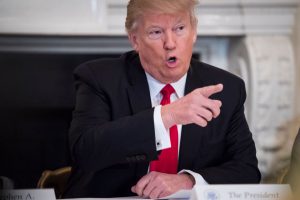Twitter And Trump, And Twitter, Trump And Trevor Noah
There's plenty of good news regarding Twitter and Trump this week.

(Photo by Jabin Botsford/The Washington Post via Getty Images)
Yesterday, the Southern District of New York upheld the First Amendment rights of Twitter users in a case where President Trump — a man notoriously bad at handling criticism — blocked the accounts of several individuals. While criticism comes with the territory of being a politician and in the digital age that means disapproval on social media, Trump decided that instead of just ignoring these individuals, he would block their accounts. Elie Mystal has already covered the case on Above the Law, noting that Judge Buchwald found that blocking Twitter users from the @realDonaldTrump account violated the First Amendment because portions of the account operates as a public forum, but that muting a user on Twitter posed no such constitutional issue.
A couple other key points to remember:

Legal AI: 3 Steps Law Firms Should Take Now
First, just because a court found that @realDonaldTrump’s account could not block users without violating those users’ First Amendment rights, it does not mean that any politician with a Twitter account would face the same ruling. In Trump’s case, his Twitter bio lists that he is the 45th President of the United States. Trump issues statements on public policy, the White House Social Media Director Daniel Scavino assists with the tweets, and announces official government business on this account. The National Archives and Records Administration (NARA) deems the tweets from @realDonaldTrump as official records that must be preserved under the Presidential Records Act. In other words, all evidence points to this account being an official government account being used in a public forum. In a world where business and personal are often mixed, one danger for politicians is the potential that higher constitutional obligations may apply.
Second, Twitter is still a private platform and therefore not subject to the First Amendment. It is a privately owned company, not one that is owned or controlled by the government. It can choose to suspend or ban users, and often does so for violations of terms of services. While Trump created a public forum within his own account as a public official, Twitter as a whole is not.
While Buchwald’s decision alone would be enough good news regarding Twitter and Trump in a week, here’s another exciting announcement: The Daily Show has a new book coming out on Trump’s tweets. The Daily Show with Trevor Noah Presents: The Donald J. Trump Presidential Twitter Library will be released on July 31 and is based on the pop-up exhibit featuring, well, some highlights (or lowlights) of Trump’s tweets. The book will reportedly be broken down into different sections, including “The Masterpieces” (like “Covfefe” or calling himself a “very stable genius”); “The Hall of Nicknames” (such as “Lyin’ Ted” which will be accompanied by original caricature artwork); and “Trump vs. Trump” (since Trump often contradicts himself, sometimes within 24 hours).
Oh and just in case anyone was thinking of jumping in with, “Oh, but copyright!” (after all, I’m supposed to be writing about copyright and patents, right?), a copyright infringement claim against the book would be (to borrow from Trump) a real loser. First, some tweets may not be copyrightable because they don’t cover original expression. Many tweets are simply facts and sometimes facts can only be expressed in a limited number of ways. The fact that Twitter — especially in the days of the 140 character limit — only allows short tweets will also reduce the likelihood that particular tweets are copyrightable. Short statements are less likely to find copyright protection because they are less likely to meet a threshold of original expression. But even if Trump’s tweets are considered copyrightable, don’t forget that NARA has deemed Trump’s tweets to be presidential records (a fact noted by Buchwald) and copyright protection is not granted for government works; government records are in the public domain.
Sponsored

Navigating Financial Success by Avoiding Common Pitfalls and Maximizing Firm Performance

Legal AI: 3 Steps Law Firms Should Take Now

Is The Future Of Law Distributed? Lessons From The Tech Adoption Curve

Navigating Financial Success by Avoiding Common Pitfalls and Maximizing Firm Performance
And even if all these barriers are overcome, even if the tweet is considered copyrightable and that particular tweet is not considered to be a government work (which is defined in U.S. copyright law as a work prepared as part of the government official’s official duties), a copyright infringement suit would still fail. This book is a clear case of fair use: it is clearly a criticism of Trump and his presidency-by-Twitter.
Krista L. Cox is a policy attorney who has spent her career working for non-profit organizations and associations. She has expertise in copyright, patent, and intellectual property enforcement law, as well as international trade. She currently works for a non-profit member association advocating for balanced copyright. You can reach her at kristay@gmail.com.
Sponsored

Generative AI In Legal Work — What’s Fact And What’s Fiction?









